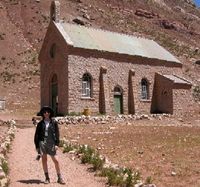I have been thinking a lot more concretely about the challenge of sustainable living, partly because of the general increase in chatter about climate change, partly because a committed group of people at my church are pushing us all to really, really think about how we are living the UU 's Seventh Principle ("Respect for the interdependent web of all existence of which we are a part"). My recent increased reflection is not at all due to those stupid concerts last month, however. Those were just lame.
We're pretty environmentally conscious folk, Enrico and I, but my thinking has been pushed quite a bit by joining a CSA, Community Supported Agriculture, where you buy a "share" of food for the season from a local farm. We have a half-share each of vegetables, fruit and eggs, which we pick up at our neighborhood farmer's market every Wednesday. (This particular farm also sells meat, and we have gleefully entertained the thought of buying a half hog for the dogs, but alas, we'd have nowhere to store it.)
This all came about because the aforementioned church group was educating us on the enormous amount of fossil fuels consumed just by shipping food. Plus there have been a couple of books recently written by people who have experimented with a strictly local or organic lifestyle, mostly notably Animal, Vegetable, Miracle by the illustrious Barbara Kingsolver. There's a group that challenges people to spend one month living on the "100-Mile Diet," a diet of things produced within 100 miles (local variants include the 150-mile diet and the Washington state diet, which for Seattelites open up considerable fruit, grain and dairy options from east of the Cascades). We're tempted to give it a try, and there's a local organization sponsoring a Seattle effort; their Web site provides tips on where to find specific foods, restaurants that would meet the rules, etc. Of course, I would have to give myself at least one major exception: Coffee.
Meanwhile, this growing awareness of ethical choices in consumption are in my mind every time I buy something. My love affair with Trader Joe's has faded, as I simply cannot bring myself to buy their frozen pizzas any more, imported from Italy. I just don't need to burn that many fossil fuels for a frozen pizza. Sometimes, the choices seem complicated. When you're at the grocery store, how do you trade off organic versus local versus recyclable packaging? Our wooden patio furniture is losing its finish from our wet summer; is it more ethical to paint it with nasty chemicals to preserve it longer, or let it rot faster and consume more wood furniture over the years? Is it better to live in a dense urban area, relying on mass transit and remote food sources, or take up a fat plot of land in the country where you grow your own food but drive a lot? And it's hard to know how significant some of these measures are. I've been skipping my shower on laundry day, to balance the hot water consumption - if everybody did that, what kind of difference would it make?
And yes, I know you can assuage your conscience by paying into a "carbon offset" fund (e.g. you pay someone to invest in a renewable technology that exactly offsets the amount of carbon emissions you generate by, say, flying to visit your sister) - but that seems fishy to me. My carbon has still been emitted, right?
Perhaps the biggest question comes around cost. I used to think that "frugal" living was part of the solution, on the theory that materialism drives overconsumption as well as socioeconomic disparities. When I took a break from work a few years ago, I was a master a bargain-hunting. But many of those bargains break all the sustainability rules - the organic stuff is always more expensive, and the cheapest goods are made in China which, politics aside, require a lot of fossil fuels to arrive at my doorstep. I've been trying to buy local cheese and man, that can be really expensive. Is the sustainable lifestyle inherently elitist? Or is it incumbent on those of us with the financial means to pay the sustainable living premium? In the long run, would this create better and more efficient markets that are financially accessible to more people? Perhaps this is the true cost of living on Earth, but tell that to someone trying to raise a family in Seattle on minimum wage.
Anyway, this is long and rambling, but that's how the whole thing feels. We'd like to craft a life that's in balance with the Earth, but it's a complicated business.
